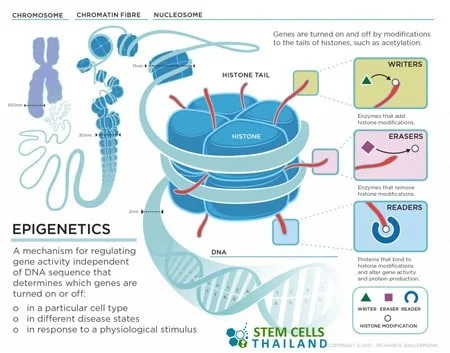
Epigenetics relates to the process wherein regulatory proteins have the ability to switch genes on and off in such a way that it may be passed on at some point in the process of cellular division.
Epigenetics refers to modifications in gene expression that don’t involve changes to the underlying DNA sequence. While the genetic code (DNA sequence) remains unchanged, epigenetic changes can switch genes on or off. Epigenetic therapy, therefore, is an approach to treat diseases by modifying the epigenetic markers on DNA and histone proteins, with the primary goal being to reactivate silenced genes or suppress overactive ones.
Epigenetic therapy primarily targets the enzymes that add or remove these epigenetic marks, thereby influencing gene expression. Some of the main approaches include:
With the ongoing discovery of new epigenetic markers and the development of more refined tools to modify them, epigenetic therapy holds promise as a powerful approach to treating a variety of diseases. As our understanding of the epigenome deepens, The Regeneration Center expects more targeted and effective treatments to emerge.
If you've seen people take ice baths or cold showers and wondered if they're onto… Read More
Immunomodulation stands at the forefront of biomedical research, steering the immune system's ability to fight… Read More
Stem cell research leads the charge in medical innovation, heralding revolutionary advances in regenerative medicine.… Read More
The blood-brain barrier (BBB) is a crucial shield for the brain, regulating the entry of… Read More
While peptide bonds are fundamental to protein structure, their direct relationship with stem cells lies… Read More
When discussing cutting-edge cancer treatments, NK cell therapy stands out due to its unique approach… Read More